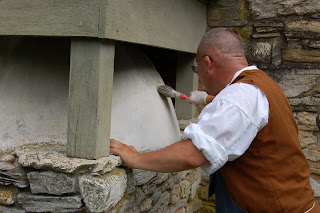“The music had little air or melody, but consisted of simple, long notes, combined in the richest harmony. I almost began to think myself in the world of spirits, and that the objects before me were ethereal.”
Sound like a pretty interesting music review? It should. It was written over 230 years ago by a witness who saw a performance by the Ephrata Chorus. Back in the 1700s, this music attracted the attention of people who traveled for miles to hear them sing. Unfortunately, this music fell silent and remained so for more than 200 years.

The last weekend of May, 2009, we got together with some friends to see the 50th Anniversary concert of the Ephrata Cloister Chorus. On this beautiful Sunday the chorus recreated the first concert performed when it was reformed in 1959, by music professor Russell Getz.
The 45-member chorus containing current members and alumni from years past alternated between musical selections and readings of 18th-century newspaper articles.
We asked the chorus director, J. Darryl Hollinger, about the performance. He said, "We try to make it sound like what we think it would have sounded like 250 years ago." (You can listen to audio clips of the Chorus here.)
The founder of the Ephrata Cloister, Conrad Beissel, was known for instructing chorus members to sing with their heads bowed and mouths almost shut. He was extremely demanding with how the singers performed and even took care of their voices. In fact, Beissel even said that “the angels when they sang at the birth of Christ had to make use of our rules.”
Lots of colonial sites have festivals featuring colonial food, crafts, and activities for children, but few if any have an event that specifically features the colonial building trades and preservation of colonial structures. On June 6th, the Ephrata Cloister featured its 3rd annual Building History: Making and Saving Historic Architecture.
It was a great opportunity to discover the techniques used to build the first homes in the Lancaster area with demonstrations of log hewing, shingle making, wall construction, thatch roofs and early masonry, painting, and window making, to name just a few of the trades that were represented.

The demonstrators were more than happy to share their knowledge. Visitors could take a special walking tour focused on the characteristics of early Pennsylvania German architecture and take advantage of a rare opportunity to tour the unrestored areas of the Ephrata Cloister.

The event also featured lectures by noted local historians. Alan Keyser shared his vast knowledge of Pennsylvania German hearths and heating, and author Cynthia Falk lectured on changes in 18th-century Pennsylvania German architecture.
The highlight for me was a demonstration on colonial pipe drilling. It’s really unbelievable the amount of sweat and labor that went into colonial water systems. You could even participate and give the drill a couple of turns yourself – I gave up after three turns. The whole event was fascinating, fun, and offered something for the whole family.
 Be sure to check out Ephrata's calendar for more events and programs that combine history with food, music, and crafts.
Be sure to check out Ephrata's calendar for more events and programs that combine history with food, music, and crafts.


0 comments:
Post a Comment